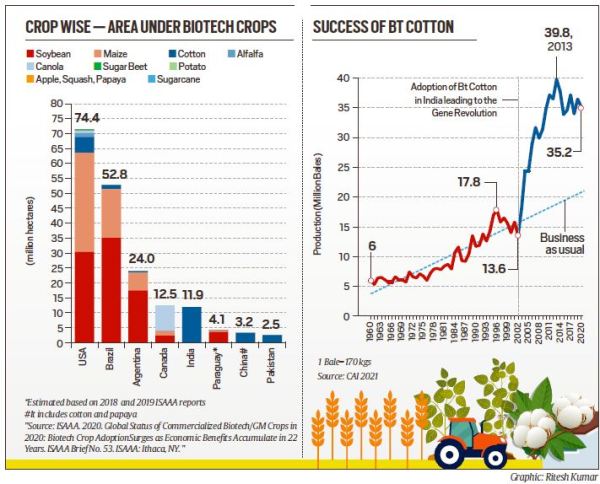GM Mustard: A win for science and the farmer
Context:
- The government recently gave clearance for the release of GM Mustard Hybrid DMH 11 based on the recommendations of the Genetic Engineering Appraisal Committee (GEAC) under the Ministry of Environment, Forests and Climate Change.
Significance of the move
- Reflects the determination of the government to move towards Atmanirbhar Bharat.
- It also meets the aspirations of our scientific community and farmers can derive the benefits of innovative technology.
- Science-led revolutions give and have given India self-respect and global recognition.
- India would be at the forefront of the gene revolution and emerge as a major export hub to other Asian and African countries.
Need for adoption of GM crops
- Scientific innovations like GM Crops has to be adopted to meet the current challenges as given below
- Over-exploitation of natural resources (soil, water, biodiversity)
- Declining factor productivity
- Urgency to achieve sustainable development goals, especially ending poverty and hunger, and
- Addressing timely the adverse effects of climate change
GM Crops- World status
- Genetically modified maize, soybean, cotton, tomato and canola are grown across the world and the area currently under GM crops is about 200 m ha.
- Corn and soyabean in the US, Brazil, Argentina, and
- Canola (rapeseed/mustard) in Canada
- Bt Cotton in India
- Bt Brinjal in Bangladesh
- More than 70 countries have accepted the use of GM crops.

India’s history of GM crop adoption
- First GM crop, Bt cotton, was adopted in 2002 in India. India had witnessed remarkable changes after its adoption as below:
- Cotton production witnessed an increase of 192 per cent in just 12 years.
- Cotton productivity increased from 302 kg per hectare in 2002-03 to 566 kg per hectare in 2013-14, an increase of 76 per cent.
- Area under cotton cultivation expanded by 56 per cent, of which about 95 per cent is under Bt cotton.
- The income of cotton farmers increased significantly.
- It made India the second-largest producer after China, and the second-largest exporter after the US, of cotton in the world today.
Issues associated with GM crops
- The success of Bt cotton holds many lessons for policymakers but several concerns have been expressed by NGOs, civil society groups and farmers’ groups from time to time to emphasize the risks associated with GM crops. Some of these include
- enhanced sucking pest damage in Bt cotton;
- increase in secondary pests such as mired bugs and Spodoptera;
- emergence of pest resistance;
- environmental and health implications in terms of toxicity and allergenicity that can cause hematotoxin reactions in the human body and, of course,
- farmers’ exposure to a greater risk of monopoly in the seed business.
Arguments in favor of GM crops- especially GM Mustard
- India- already a consumer of GM crop products
- To meet the existing deficit in edible oils (about 55-60 per cent), India is currently importing around 13 million tonnes, of which 2.0-2.5 mt soybean oil and 1.0-1.5 mt canola oil besides, the 1.5 mt of GM cotton oil produced domestically are GM oils.
- Against the right of farmers
- By not allowing GM mustard or for that matter even Bt brinjal for so long, one is denying the basic rights of farmers who want to increase their incomes.
- No associated health risks
- It is scientifically proven that the consumption of refined GM oil does not allow any protein to enter the human system and hence is completely safe from a health point of view.
- Increase productivity
- Production of GM Mustard hybrids will go a long way in increasing our yields, while reducing the use of pesticides.
- The field trials of GM mustard at different locations showed 25-28 per cent higher yield and better disease resistance compared to indigenous varieties which can go a long way in augmenting domestic mustard oil supplies and farmers’ incomes.
Way forward
- The Department of Agriculture (DoA) and ICAR need to move forward fast and provide an enabling environment to test the available seed of Hybrid DMH 11 in the current rabi season.
- It must also encourage public-private partnerships to produce quality seeds to cover more area next year.
- Scientists at ICAR institutes must also be encouraged to develop new GM Mustard hybrids on a mission mode.
- Government should go ahead with not just GM mustard but also fast-tracks Ht Bt cotton, Bt brinjal, and even GM soya and corn.
reference:
Subscribe
Login
0 Comments
